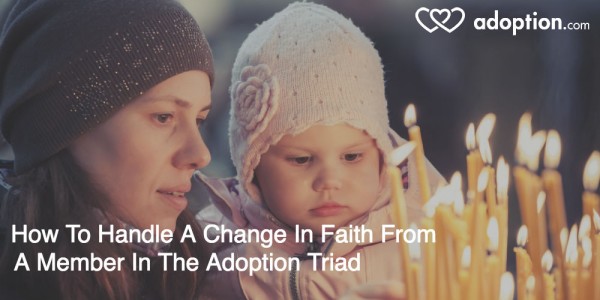Two years ago, a Pew research study was released stating that church attendance by millennials had dropped by eight points, pushing many religious officials to focus on retaining and regaining the trust of an entire generation. (In my personal life, I have seen about the same percentage of my friends and family eschew traditional religious affiliation over the past few years.) Many adoptions are facilitated by religious agencies, some requiring proof of creed, others looking for particularly “devout” adoptive applicants. Birth parents often want adoptive parents who will be able to provide a specific religious foundation for their child and state-specific religious preferences. But what happens after the adoption if one party (birth, adoptive, or adoptee) loses or has a change of faith?
I learned a lot about what to say (and what not to say) to those close to me who have changed their beliefs from Dr. Julie de Azevedo Hanks, Ph.D., LCSW and author of The Assertiveness Guide For Women and realized that her advice could really help all members of the adoption triad who find themselves with changed faith circumstances.
- Have empathy. Navigating a crisis of faith isn’t an easy decision or quick decision. It’s likely that many tears have been shed on behalf of this decision, and even more likely that prayer has been involved. You may not agree with (or understand) their decision, but know it wasn’t made lightly or out of spite.
- Be open and honest. It doesn’t do anyone any good to bottle up feelings and questions, especially if both parties are genuinely seeking to understand the other. If a major part of the decision to place involved religious preferences it is not asking too much to answer honest concerns—and this includes concerns from the adopted child.
- Be kind. There are only two ways your conversation can go: well and very poorly. Understand that no minds will be changed by your admonitions. Even worse, if you view this conversation to call your child’s birth parent to “repentance,” you may damage the relationship. A biological dad who chooses to express remorse at his placement choice is, ultimately, hurting his child. A parent who tells a teen adoptee that she is “going to Hell” can only expect a chilly response. Speak with love and kindness—no matter which member of the triad has amended his faith.
- (Re)Establish common ground. For birth parents, remember that religion was not the only reason you chose this family. While it may have played a large role in your choice, there were many other reasons you chose the parents for your child. Where or if or who they worship doesn’t change their love for your child or you. As Dr. Hanks said, “A loved one’s choice to leave the Church should never be a reason to reject them.” You still have lots in common and love each other—no matter where, when, or if you worship.

